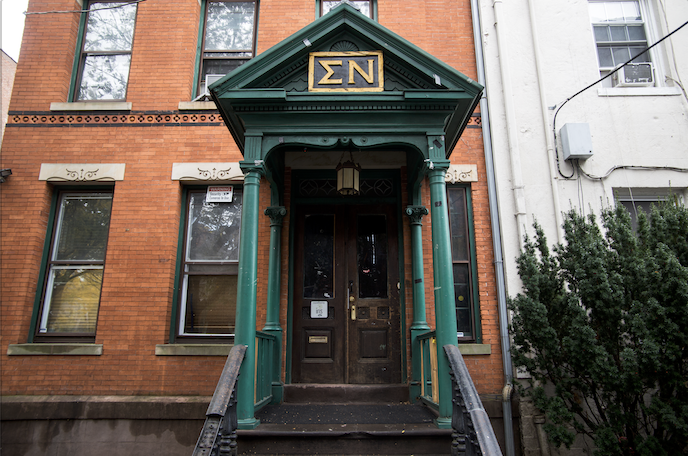
With criticism of Greek life — and especially fraternities — gaining traction on campus this year, the leaders of Yale’s Greek organizations have been meeting since the fall to discuss best practices and their role on campus as part of a new initiative spearheaded by Associate Vice President of Student Life Burgwell Howard.
Howard said he has invited all of Yale’s Greek organizations — six sororities and 13 fraternities, including both the social and service-oriented groups — to participate in voluntary discussions. The council began meeting regularly this past fall and convenes around every six weeks.
“Being a leader of a Greek-letter organization is [a] challenging student leadership role, and for those groups that play a part of the social landscape of campus, there are additional concerns and areas to think about,” Howard said.
Representatives from sororities Kappa Kappa Gamma and Kappa Alpha Theta and fraternities Alpha Delta Phi, Alpha Epsilon Pi, LEO and Sigma Nu have attended council meetings, according to the leaders of those organizations.
Representatives of the sororities Alpha Phi, Pi Beta Phi, Delta Sigma Theta and Omega Phi Beta and the fraternities Alpha Phi Alpha, Beta Upsilon Chi, Chi Psi, Delta Kappa Epsilon, Lambda Upsilon Lambda, Sigma Chi, Sigma Phi Epsilon and Zeta Psi did not respond to requests for comment. Fence Club President Katherine Hong ’19 declined to comment.
The council serves primarily as a forum for representatives to discuss common challenges, such as safely hosting parties, engaging positively with New Haven and holding rush events. Howard said he hopes the council will add more structure to fraternity recruitment, so that the rush process is easier to navigate for potential members and rush events for different fraternities are not all scheduled for the same time. While Yale’s Panhellenic sororities — Alpha Phi, Kappa Alpha Theta, Kappa Kappa Gamma and Pi Beta Phi — are connected by the Yale Panhellenic Council, which runs recruitment for the four sororities, there is no interfraternity council at Yale.
The council also aims to be a source of accountability among fraternities to ensure that groups obey University rules prohibiting fall rush events for first years, according to Howard.
“Sometimes in the past, people have had concerns that some groups were rushing students outside of the general norms but there wasn’t any group to resolve those disputes or decide what those norms should be,” Howard said. “If someone is violating some kind of mutually agreed upon procedure, there’s a group of people to discuss it.”
Howard said he convened the group after a series of conversations with the Yale College Council Greek Life task force. In a 2016 report, the YCC recommended that the University establish and maintain a Greek council as a “way to address any concerns that the YCDO might have about risk management, student relations, campus sexual climate and issues of racial sensitivity or discrimination.”
The task force’s report focused primarily on helping the Greek community at Yale better reflect the racial and socioeconomic diversity of the student body. YCC President Matt Guido ’19 said the council is still considering whether a formal Greek council, with required attendance and participation by all Yale’s Greek organizations, would be feasible and effective. He added that in order for the council to be successful, it would need “buy-in from all of the leadership involved” in Greek life.
At the moment, attendance at council meetings is voluntary, but Howard said the group has had “great representation from most of the invited organizations” this past year.
The issue of sexual assault prevention has been a recurring topic of discussion at council meetings. Howard said some fraternity and sorority leaders have shared the risk management strategies that their organizations use at social events, such as employing coed bartenders and bouncers and designating sober members, and that this kind of discussion can prompt other groups to take action.
Howard added that the council plans to organize a day of service at the end of this year for members to volunteer in New Haven or clean up local neighborhoods, where many fraternity and sorority houses are located.
AEPi President Robert Proner ’19 said he applauds Howard’s “proactive effort” in convening the group but said the University is still struggling to find commonalities among different Greek organizations.
“It’s difficult to coordinate shared resources and practices when you’re dealing with groups as different as Leo, AEPi, DST, Theta and Fence,” Proner said. “This being said, this council is still in its infancy and may take on a more cohesive character going forward.”
Kappa President Raeven Grant ’19 said she began attending Greek council meetings in February and that she hopes to see more collaboration among Yale’s Greek organizations in the future. She added that Kappa is excited to participate in the Greek-wide community service project brought up at the last meeting.
Alice Park | alice.park@yale.edu







